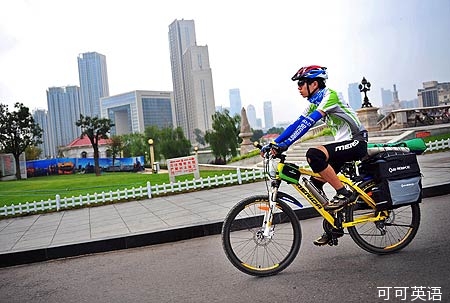
Sun Xiaodong hasn’t received a single job offer yet, but he isn’t concerned. The computer science major at Huazhong University of Science and Technology has no intentions of starting work immediately after graduating. Instead, the 23-year-old is planning a trip to Sichuan and Tibet with his classmates to celebrate their graduation.
盡管孫曉東(音譯)還沒(méi)找到工作,但他并不擔(dān)心。畢業(yè)于華中科技大學(xué)計(jì)算機(jī)科學(xué)專(zhuān)業(yè)、現(xiàn)年23歲的他并不打算一畢業(yè)便開(kāi)始工作,而是正計(jì)劃著和同學(xué)一起前往四川和西藏,來(lái)場(chǎng)畢業(yè)之旅。
Apart from its ritual function of saying farewell to college life, a graduation trip now also serves as a form of escapism and soul-searching for graduates.
除了作為告別大學(xué)生活的儀式外,如今的畢業(yè)旅行也成了畢業(yè)生逃離現(xiàn)實(shí)追尋自我的途徑之一。
Yu Dongxue, 22, a journalism major at Sichuan University, thinks a graduation trip with her classmates is a once in a lifetime experience – they’re not married and are not bound by job obligations. So, even though Yu already took a loan to finish college, she is still borrowing money to embark on her graduation rite to Jiuzhaigou.
來(lái)自四川大學(xué)新聞專(zhuān)業(yè)、22歲的郁冬雪(音譯)認(rèn)為,和同學(xué)一起踏上畢業(yè)旅行這樣的經(jīng)歷一生僅此一次——大家都還沒(méi)有結(jié)婚,也沒(méi)有工作職責(zé)的束縛。因此,雖然是靠貸款讀完大學(xué),她還是決定借點(diǎn)錢(qián)來(lái)籌備自己的九寨溝畢業(yè)之旅。
“The most important point is that we are young,” says Yu. “This innocent emotion among classmates and the spirit of curiosity and passion may never come back.”
“最重要的是我們都年輕,”郁冬雪說(shuō)。“同學(xué)之間純粹的感情以及我們的好奇心和激情或許會(huì)一去不復(fù)返了。”
Wang Cunfu, 22, a senior majoring in law at China University of Political Science and Law, agrees: “This summer is the last time we will have so few responsibilities, so I will do my best to go somewhere far away.”
對(duì)此,中國(guó)政法大學(xué)法學(xué)專(zhuān)業(yè)大四學(xué)生、22歲的王存福(音譯)十分認(rèn)同:“這個(gè)夏天是我們最后一次毫無(wú)負(fù)擔(dān)的時(shí)光了,我會(huì)盡可能地去遠(yuǎn)方走走。”
New perspective
全新視角
Ma Yu’an went on a bicycle tour deep into Qinghai and Tibet for three months last year, as he couldn’t find a job after graduating from a degree in history at Tianjin University.
去年,畢業(yè)于天津大學(xué)歷史學(xué)專(zhuān)業(yè)的馬宇安(音譯)因?yàn)楫厴I(yè)后找不到工作,于是花了三個(gè)月時(shí)間深入青海和西藏進(jìn)行了一次單車(chē)之旅。
“For me, it was an escape from the pressure and anxiety of entering society,” says Ma.
“對(duì)我來(lái)說(shuō),這是從步入社會(huì)的壓力和焦慮中逃離。”馬宇安說(shuō)。
After meeting peers from all over the country on his trip, Ma now shares his stories of being on the road as a freelance blogger and photographer, even though his parents aren’t happy with it.
旅行途中,馬宇安遇見(jiàn)了來(lái)自全國(guó)各地的同齡人,如今的他已經(jīng)是一名自由博主兼攝影師,和大家一起分享著自己的行者故事,盡管他的父母對(duì)此并不滿(mǎn)意。
“I would not be working in this ‘unstable’ job had I not come out of my comfort zone,” says Ma. “But I do see my life differently now.”
“如果我還沒(méi)有走出自己的‘舒適地帶’的話(huà),現(xiàn)在也就不會(huì)從事著這樣一份‘不穩(wěn)定’的工作了,”馬宇安說(shuō),“但我確實(shí)感覺(jué)到我生活的改變。”
Gao Liankui, 24, who traveled to Nepal after graduating from Shenzhen University in 2011, agrees.
對(duì)此,現(xiàn)年24歲的高連奎(音譯)表示贊同。2011年,剛剛從深圳大學(xué)畢業(yè)的他便旅行去了尼泊爾。
“Some students think it’s important to get a job right after their graduation, otherwise they may never get one,” says Gao. “But that’s not true. Jobs will still be there when you return while youth doesn’t wait.”
“有些學(xué)生覺(jué)得畢業(yè)后馬上找份工作很重要,否則可能就會(huì)永久失業(yè)了,”高連奎說(shuō)。“但其實(shí)不然。你回來(lái)時(shí)工作還在那里,但青春可不等人。”
Beneficial experience
獲益良多
According to Gao, traveling can improve your skills in various areas.
高連奎表示,旅行能夠提升你在許多方面的能力。
By working out a budget and a route, planning activities, and arranging accommodation, Gao feels he has become more organized and efficient. Talking to peers in hostels not only puts your communication skills to the test, it’s an eye-opening experience and a chance to make like-minded friends.
通過(guò)做預(yù)算、定路線(xiàn)、規(guī)劃活動(dòng)、安排住宿,高連奎覺(jué)得自己變得更有條理也更高效了。在青年旅社里和年輕人聊天不僅是對(duì)你溝通能力的考驗(yàn),也是一次開(kāi)闊視野、結(jié)交志同道合的朋友的機(jī)會(huì)。
Nie Xiang, 28, a hostel owner in Dali, Yunnan province, supports this notion.
現(xiàn)在云南大理經(jīng)營(yíng)著一家青年旅社、28歲的聶湘(音譯)贊同這一觀點(diǎn)。
“Hostels are made for young travelers and offer them many opportunities to make friends,” Nie says.
“青年旅社就是為年輕行者們開(kāi)設(shè)的,為他們提供結(jié)交朋友的機(jī)會(huì)。”聶湘說(shuō)。












